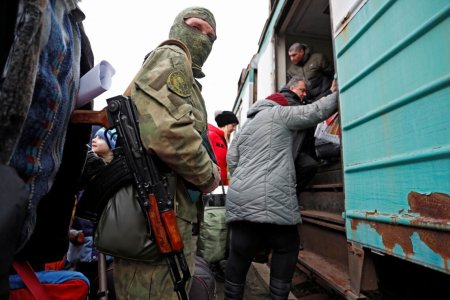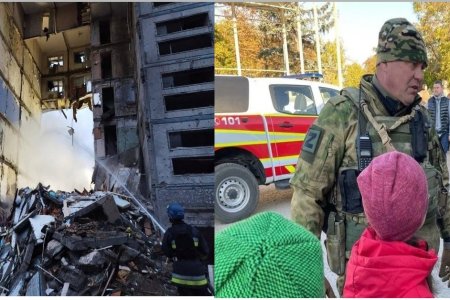
The Russian occupation regime in Mariupol has reported that 263 teenagers have been placed on a register (for heightened surveillance), with 16 young people thus targeted for what are described as “actions of an extremist nature”. 217 young Ukrainians are claimed to have taken part in internet groups “of a suicidal or destructive nature”. What precisely is meant by a ‘destructive nature’ or by the term ‘radicals’ is of particular importance given that 48 young Ukrainians have been subjected to forced ‘psychiatric treatment’.
The Russian propaganda ‘Donetsk news agency’ reported on 15 October that a meeting had taken place of an ‘interdepartmental working group’. At this meeting, “it was stressed that the Ukrainian side in the SMO [special military operation – Russia’s euphemism for its war against Ukraine] are trying through the Internet to draw children into terrorist activities, moreover not only in the new regions [sic!] but in all of Russia”.
Russia has set about indoctrinating children and young people on any territory that falls under its occupation, as well as establishing full control over all channels of information, including social media. Since 2014, the Russian proxy ‘Donetsk and Luhansk people’s republics’ have been seizing Ukrainians who reported Russia’s involvement in the military action or simply criticized Russia and its proxy regimes, subjecting them to torture and, often sentencing them to huge terms of imprisonment. Three Ukrainian hostages, Valery Matiushenko, Olena Fedorak and Marina Yurchak, were finally released in 2024, as part of exchanges of prisoners. All had been savagely tortured and imprisoned for almost seven years for their pro-Ukrainian position and their opposition to Russia’s military aggression. Other hostages, seized long before Russia’s full-scale invasion of Ukraine, remain imprisoned, as are a huge number of Ukrainian civilians abducted from February 2022. The grotesque show trials staged against Iryna Navalna, Serhiy Kuris,, Oleksandr Pokorielov, Hryhory Sinchenko and others make it clear that Russia is using ‘terrorism’ charges against those seized for their pro-Ukrainian views.
It is extremely likely that the teenagers, now incarcerated in ‘psychiatric institutions’, are also there because of their views.
The current Russian regime has been quietly resurrecting the notorious practices of Soviet punitive psychiatry for many years now, with this recently used against Ukrainians in occupied Crimea or from other parts of Ukraine that came under Russian occupation. In Crimea, for example, Crimean Tatar human rights activist Yunus Masharipov faced absurd charges, without any evidence, with the activist, placed in a psychiatric ward, rather than a prison, with this potentially enabling the regime to keep him imprisoned indefinitely.
In December 2022, a Russian court forcibly placed Victoria Petrova in a psychiatric hospital for social media posts condemning Russia’s war of aggression against Ukraine.
In March 2023, Ukraine managed to return a Kharkiv woman to Ukraine after she had been effectively held prisoner in two Russian psychiatric hospitals for ten months (seemingly after being taken to Russia from parts of Kharkiv under occupation in early 2022). She had been offered her release (officially, discharge from hospital) several times, but only if she agreed to take Russian citizenship, which she consistently refused to do.



